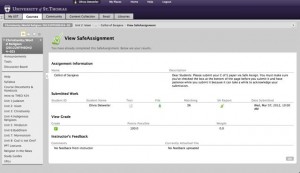Plagiarism has not been a recent issue at St. Thomas, but some professors at the university are taking part in an experiment with the goal to keep it that way.

The College of Arts and Sciences is testing two different types of anti-plagiarism software: SafeAssign and Turnitin. Seventeen professors from seven St. Thomas departments are having their students submit papers through Blackboard, where the papers will automatically run through SafeAssign and Turnitin.
Although the university is experimenting with the programs, Kris Bunton, interim associate dean of the College of Arts and Sciences, said there has not been an increase in plagiarism at St. Thomas.
“It’s simply that we got enough requests from faculty to buy one of these programs to use to help our students be more honest,” Bunton said.
The university decided to put the two programs to use this semester.
“Turnitin.com is the best known (software) across the country. This year, we have access to Turnitin and SafeAssign,” Bunton said. “(SafeAssign) is like Turnitin in many ways, but it just happens to be the one that comes with Blackboard.”
Academic Technology Consultant Eric Larson said SafeAssign and Turnitin are similar.
“All the tool is doing… is comparing strings of texts. The computer doesn’t know if something (is) plagiarized or not. It just knows this phrase that was in your paper matches this phrase that is in this database that was used elsewhere,” Larson said.
The anti-plagiarism programs scan and check papers against web pages and library databases. If the software detects sentences or phrases of words that match against the web pages or library databases, the program will inform the professor of the matching sentences, Larson said.
Sophomore Abby Chambers said the process for submitting papers through the anti-plagiarism programs is easy.
“From the student’s end, there is no difference when submitting it on Blackboard,” Chambers said.
Students might not find any differences when submitting papers on Blackboard because of the new software, but senior Angela Mohar said it could change how students research and write their papers.
“I think it could definitely change the way students research just because we’ll be more cautious that our professors have all these new tools to safeguard against plagiarism,” Mohar said.
Bunton said that feedback from students like Chambers and Mohar will help the university decide which software is the most user-friendly. Also, professors will give their opinion on the anti-plagiarism software they prefer to use. The university will then take the feedback from students and professors and commit to only one software program.
St. Thomas is specifically looking at the programs’ result accuracy and how fast the programs can give back results, Bunton said.
“There’s a whole variety of factors that the IRT team has identified. The faculty will then be comparing their students’ experiences with both programs. We hope at the end of the process we come out with a recommendation,” Bunton said.
However, Mohar has mixed feelings about the necessity of these programs.
“I think it could definitely be a way for the professors to easily check, but at the same time, they should know the material that the students are writing on enough to not have to use a program,” Mohar said.
Olivia Detweiler can be reached at detw5520@stthomas.edu.

